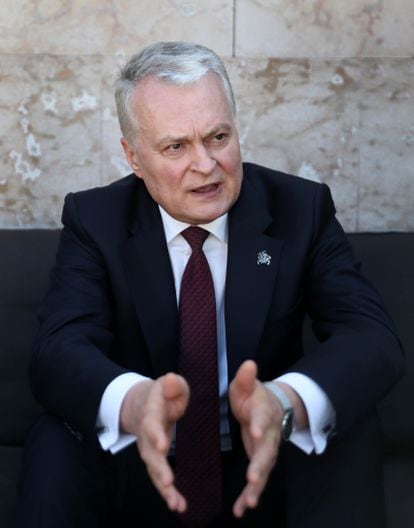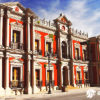/cloudfront-eu-central-1.images.arcpublishing.com/prisa/3R5TKC2AHZEO3K7CNIT7EL3EAU.jpg)
His exquisite manners clash with the forcefulness of his messages. Over the last 15 months, the president of Lithuania, Gitanas Nauseda, 58, has become one of the main allies of the Ukrainian government. Since the beginning of the Russian invasion, he has demanded an ever greater commitment from the West: more and better weapons for Ukraine and the adoption of new sanctions against Russia. The Lithuanian leader urges the members of the EU and NATO to ignore the so-called red lines and to support Kiyv with everything necessary to win the war.
On a recent visit to Madrid as part of a European tour to address the future summit of the Atlantic Alliance, to be held in Lithuania in July, Nauseda spoke to EL PAÍS after meeting with Spain’s Prime Minister Pedro Sánchez and before visiting King Felipe VI.
Question. You have argued in recent months that the West needs to deliver many more weapons to Ukraine. Don’t you think there is any chance of reaching a negotiated solution?
Answer. We all are interested to see peace negotiations, but those peace negotiations should not be performed at the cost of the territorial integrity of Ukraine. Otherwise, it would be difficult to expect that this will be a frank and honest negotiation, and probably Russia will use the opportunity to consolidate resources and to organize the offensive again. Both sides are too far away from each other to find a compromise on many issues. So this is the reason why right now I am not very optimistic about possible chances to sit at the table and to discuss issues which are relevant. In order to have a frank negotiation, it’s very important to see the progress of Ukrainian forces on the battlefield.
Q. What does Ukraine need to achieve these gains on the ground?
A. I think that Western countries are living up to the expectations of the Ukrainians, but unfortunately we are being very slow in making important decisions. It has taken us too long to cross the red lines. At first, there were doubts about the possibility of sending any type of weaponry; then one red line after another was crossed, as with missile launcher systems or tanks.
Q. What red lines need to be crossed now? Modern fighter jets and long-range cruise missiles?
A. Yes, I think those red lines can be crossed now too. And we had better do it as soon as possible, because all the hesitations of the past have been a waste of valuable time. All the lost time means more broken lives and more destroyed infrastructure.
Q. The European Commission is working on a new package of sanctions against Russia. What else can be included?
A. Lithuania has consistently advocated for even tougher sanctions, and we would like to see [state-owned energy company] Rosatom and its board of directors added to the sanctions list. Diamonds and dual-use [civilian and military] technology should also be included, in addition to making a greater effort to prevent Russia from circumventing sanctions.
Q. Do you think China can act as a mediator?
A. China can prove that it can be a global player on the international scene, but only with one precondition. It has to condemn the war in Ukraine and clearly state who is the aggressor and who is the victim. From this moment on, China might be very constructive in solving this conflict and especially providing the forum for peace negotiations.
Q. The next NATO summit will be held in July in Vilnius, the Lithuanian capital. What do you expect from that appointment?
A. We have a very ambitious agenda for the summit. One of the main issues will be to implement all the agreements reached last year in Madrid in relation to the Alliance’s Reinforced Forward Defense operation in the Baltics, which is essential for the defense of the eastern flank and will serve as a deterrent against the unlimited imperialist ambitions of Russia. It’s also very important to find a compromise on the defense investment pledge and to treat the 2% [of GDP] as a baseline, not as a ceiling anymore. If we want to increase the productive capacity of the arms industry and continue to supply Ukraine with weapons as before, it is necessary to further increase our military spending.
Another angle is to bring Ukraine closer to the Euro-Atlantic security architecture. It doesn’t mean that in Vilnius we will have decisions on the membership of Ukraine, but it should send a very clear signal to Ukraine that we tried to do our best in order to bring them closer to NATO.

Q. Lithuania is the EU country that has increased military spending the most in the last decade, and one of the countries that has donated the most military and financial aid to Ukraine in relation to its economy. Can this increase in spending be sustained as long as the war lasts?
A. Of course. The people understand there is no trade-off between social benefits and defense expenditures because they understand that security is number one. If there is no security, there will be nothing else at all. It is important to understand that Ukraine is not the last target of Vladimir Putin’s regime. There will be next targets. And those countries might be Baltic countries, Poland. But I cannot exclude any country of Europe which could become the target in the future.
Q. Lithuania has been experiencing a migration crisis at its border with Belarus for almost two years. In late April, the Lithuanian Parliament passed legislation authorizing immediate deportations without immigration proceedings. How do you justify a practice that runs contrary to international law?
A. It must be kept in mind that these immigrants are used as a pressure tool by autocrats, first of all by Aleksandr Lukashenko, a close ally of Putin. These vulnerable people become both victims and a weapon for these autocrats. And to stem the flow of migrants, the only option is to take measures that discourage Belarus and Russia from employing these practices. In Lithuania we have been able to stop the arrival of migrants at the border, but we are observing that soon there will be flights again between the Middle Eastern capitals and Minsk and [the Russian enclave of] Kaliningrad, with the only goal to collect these people and to send them again to the border and challenge our security systems. We see attempts at the border of Latvia, Lithuania and Poland. Those are the target countries.
Sign up for our weekly newsletter to get more English-language news coverage from EL PAÍS USA Edition





